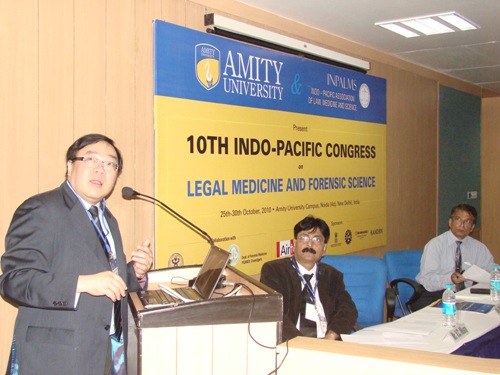25 Oct 2010-30 Oct 2010|Noida | Amity University Uttar Pradesh
Over 110 Experts of Forensic Science dwell over issues on Forensic Science and Crime Scene Investigation during INPALMS 2010 at Amity
 Pre - Conference Workshops of 10th Indo-Pacific Congress on Legal Medicine and Forensic Science held at Amity University. Eminent experts from various parts of the world gave their presentations.
Pre - Conference Workshops of 10th Indo-Pacific Congress on Legal Medicine and Forensic Science held at Amity University. Eminent experts from various parts of the world gave their presentations.
Contemporary law enforcement has greatly expanded its ability to solve crimes with the adoption of forensic techniques and procedures. Today, crimes can often can be solved with careful analysis of forensic evidence. The work of forensic scientists is not only crucial in criminal investigations and prosecutions. It is also vital in civil litigations, major man-made and natural disasters, and the investigation of global crimes. However, the success on the analysis of the forensic evidence is based upon a system that emphasizes teamwork, advanced investigative sklls (such as GPS positioning, cell phone tracking, video recording analysis, data mining), and the ability to process a crime scene properly by recognizing, collecting and preserving all relevant physical evidence.If potential physical evidence is not recognized, collected or properly preserved and tested, the forensic value of the evidence is forever lost. Sometimes the evidence are falsified or results tainted, by which justice system was gets misled. Numerous routines and high profile cases have demonstrated the harsh reality that despite the availability of current crime scene technologies, specialized equipments, and sophisticated forensic laboratory, the effectiveness in the utilization of physical evidence in crime solving is only as good as the integrity of the crime scene investigator and the objective legal system which supports those functions.
Over 110 Forensic expert from all over the globe and 300 experts from India have gathered together for the six day conference. On the first day during the Pre- Conference Workshop
Dr. Roger Byard, Chairperson, Pathology, University of Adeliede, Australia gave a presentation on “Forensic Medicine”. He spoke on the need for forensic investigation regarding sudden death of infants and young children and stressed on the concern regarding unexpected deaths of infants and young children in Australia. He said that criminal investigation have different procedures in different countries. In his country the Coronial system of investigation is there which is state based and such cases are undertaken seriously which include unexpected deaths. The pathologist plays a significant role in the police investigation of the crime cases. They are contacted by the police and Physical Evidence Officials. Especially, in some cases which are highly complicated and doubtful, pathologists are the most concerned persons. Pathology tests are part of criminal investigation. The initial examination includes ear, mouth, and skeletal survey of the body. Injuries and fractures are detected with the help of babygram in crime investigation.
Dr. Roger spoke on autopsy photographs and said that it helps in negative as well as positive findings of the cases. It helps to access the case in photographs. Autopsies are attended by police, radiographers, doctors and nurses. Special examinations of the body are done by skin dissection of neck, cheek, abdomen, backs and limbs are done. Fractured bones for Histology are taken for tests. Brain and cord for neurology, eye balls are also taken for histology. Microbiology tests are done for blood, lungs, heart and spleen. Toxicology tests are for blood, urine and liver.
Dr. Philip Beh, Institute of Pathology, Hongkong University presented the topic “Problem Based Learning.” He asserted that there are limitations on the traditional mode of teaching. According to Dr. Philip information expression means learning has to be focused and should have relevance for medical needs. Lack of information has become a problem amongst the students. They are to be well informed and at the same time they have to be extremely conscious. The students must understand the cause of their study. It should not be only book they study but certain exercises of practical field are also necessary which will help them in future. He emphasized that healthy personal and professional relationship of the tutors or facilitators with the students are essential to make the learning environment friendly.
Problem Based Learning emphasizes on teachers to assist students in active learning, students are given opportunity to talk on the stipulated subjects and the teachers listen to them, the starting point of learning is through a real clinical problem, free time is allotted for self learning, students are encouraged to think critically and the teachers know personally what the students have to learn and what they have learnt.
Dr. Ali Chadly, Prof. and Head of the Department of Forensic Medicine, Tunisia
made a demonstrative presentation on Forensic Anthropology with the help of bone models. Male and female bone structures are analyzed indeptly from forensic and crime investigative angle.
Mr. Henry Lee, Prof. and Director, University of New Heaven, USA made his presentation on the topic “Crimes Scene Investigation” and gave a detailed analysis on the photographs taken during crime spot. Crime Scene Investigations procedures were shown in a distinctive and elaborate manner. He showed the audience how to find out clues from the crime spot and gave logical reasoning as a crime investigator and also as forensic scientist.